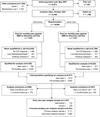Use of health information technology to improve medication adherence
- PMID: 22216772
- PMCID: PMC3641901
Use of health information technology to improve medication adherence
Abstract
Objectives: To evaluate the effectiveness of an intervention based on health information technology (HIT) that used speech recognition software to promote adherence to inhaled corticosteroids (ICS) among individuals with asthma who were members of a large health maintenance organization.
Study design: Pragmatic randomized clinical trial.
Methods: Adults with asthma enrolled in a large managed care organization (N = 8517) were randomized to receive either usual care or an interactive voice recognition (IVR) intervention designed to prompt medication refills and improve ICS adherence. The primary outcome was ICS adherence as measured by modified medication possession ratio calculated from the electronic medical record (EMR). Secondary measures included survey- and EMR-based measures of asthma morbidity.
Results: Our primary analyses found that ICS adherence increased modestly but significantly for participants in the intervention group relative to those in the usual care group ( Δ= 0.02, 95% confidence interval 0.01-0.03), with a baseline adherence of 0.42 in both groups. No difference was observed in asthma morbidity measures. In post hoc analyses of participants receiving 2 or more direct IVR contacts or detailed messages, the intervention effect was more marked. The overall effect was triple that observed in the primary analyses (0.06 vs 0.02), and significant differences were observed between groups in asthma control.
Conclusions: An HIT-based adherence intervention shows potential for supporting medication adherence in patients with chronic diseases such as asthma. However, additional research is needed to determine how best to enhance the reach and effectiveness of such interventions.
References
-
- Yeung M, O'Connor SA, Parry DT, Cochrane GM. Compliance with prescribed drug therapy in asthma. Respir Med. 1994;88:31–35. - PubMed
-
- Bender BG, Pedan A, Varasteh LT. Adherence and persistence with fluticasone propionate/salmeterol combination therapy. J Allergy Clin Immunol. 2006;118:899–904. - PubMed
-
- Williams LK, Joseph CL, Peterson EL, et al. Patients with asthma who do not fill their inhaled corticosteroids: a study of primary nonadherence. J Allergy Clin Immunol. 2007;120:1153–1159. - PubMed
-
- Gamble J, Stevenson M, McClean E, Heaney LG. The prevalence of nonadherence in difficult asthma. Am J Respir Crit Care Med. 2009;180:817–822. - PubMed
-
- Williams LK, Pladevall M, Xi H, et al. Relationship between adherence to inhaled corticosteroids and poor outcomes among adults with asthma. J Allergy Clin Immunol. 2004;114:1288–1293. - PubMed

